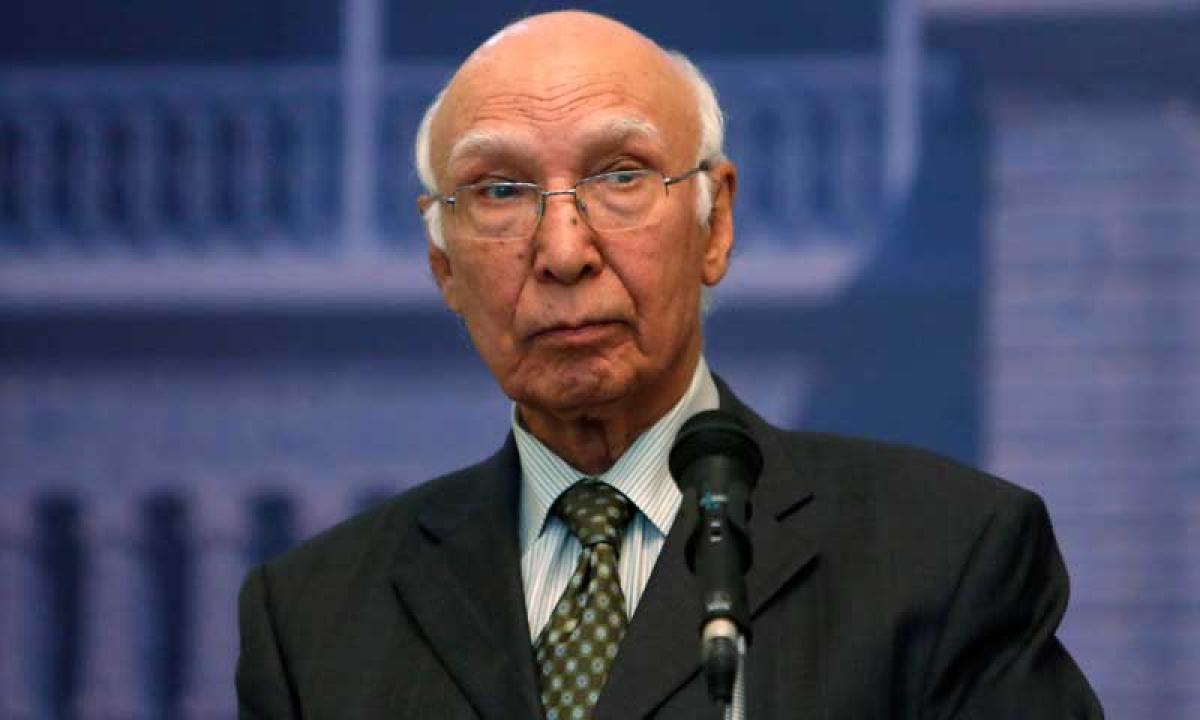Live
- Congress killers of Samvidhan: Modi
- Bejan Daruwalla’s horoscope
- Study warns: Ultra-processed foods may accelerate biological age
- CM pledges more political opportunities to Madigas
- Vizag attracts tourists as much as Kashmir
- Year-Ender 2024 Guide: Home remedies to relieve Period Pain.
- All India crafts mela begins today
- TTD gears up for Vaikunta Ekadasi fete
- Express Yourself
- Rajadhiraaj: Love. Life. Leela
Just In

Pakistan\'s top diplomat Sartaj Aziz on Saturday alleged that India\'s evolving \"expansionist\" maritime security strategy and un-demarked border of Sir Creek pose \"threat\" to the security of the Indian Ocean.
Pakistan's top diplomat Sartaj Aziz on Saturday alleged that India's evolving "expansionist" maritime security strategy and un-demarked border of Sir Creek pose "threat" to the security of the Indian Ocean.
"The un-demarcated borders in Sir Creek have the potential to cast a shadow on maritime security. India's evolving expansionist maritime security strategy is a cause for concern for peace in Indian Ocean," said Aziz, the PM's Advisor on Foreign Affairs.
He made the remarks at a conference on 'Strategic outlook in Indian Ocean Region 2030 and Beyond Evolving Challenges and Strategies' organised by the Pakistan Navy as part of a multi-nation five-day naval exercise in the Arabian Sea.
"Nuclearisation of the Indian Ocean has also led to further instability in the region," he added.
He said that with 95 per cent of Pakistan's trade taking place through sea, Pakistan was heavily dependent on a tension-free Indian Ocean.
Aziz said Pakistan is third largest Indian Ocean littoral country and as a matter of policy it continues to pursue the goals of realising the economic potential of the region.
"We are aware of our national interests and every effort would be made to strengthen our capacity to ensure that we remain ready to meet the emerging maritime security challenges. For us, to remain oblivious of the developments taking place in the Indian Ocean Region is not an option.
These developments have a direct impact on our security and prosperity," he said.
Aziz said that the several Indian Ocean Region contains several conflict zones and the region’s maritime security challenges have grown and are affected by key variables such as militarisation, the involvement of major and extra-regional powers, and non-traditional security threats.
"On the other hand, the militarisation of the Indian Ocean region, the proliferation of weapons of mass destruction, increased missile capabilities and power projection by foreign militaries are a threat to peace in the Indian Ocean Region. And this trend is likely to intensify in the coming years," he said.
"And to add to this complex scenario, today, the Indian Ocean faces many non-traditional security challenges and threats including piracy, illegal fishing, human trafficking, drug smuggling, trafficking of weapons, maritime pollution and climate change," he added.
Aziz said Pakistan has a strategic stake in peaceful navigation and security of Indian Ocean region.
"Our interests emanate from our coastline that is over 1000 kilometres long, an Exclusive Economic Zone (EEZ) of around 300,000 square kilometres, the Karachi port and the newly built deep sea port of Gawadar," he said.
He said that due to presence of several powers in the Indian Ocean, the changing power balance and relentless pursuit of national interest prompted analysts to suggest that many global struggles will play out here in the 21st century.

© 2024 Hyderabad Media House Limited/The Hans India. All rights reserved. Powered by hocalwire.com







